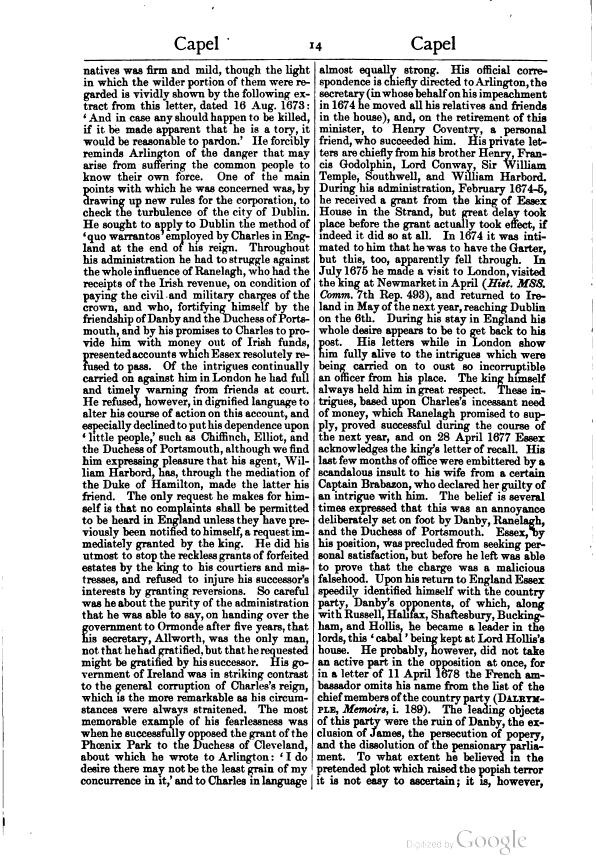natives was firm and mild, though the light in which the wilder portion of them were regarded is vividly shown by the following extract from this letter, dated 16 Aug. 1673: ‘And in case any should happen to be killed, if it be made apparent that he is a tory, it would be reasonable to pardon.’ He forcibly reminds Arlington of the danger that may arise from suffering the common people to know their own force. One of the main points with which he was concerned was, by drawing up new rules for the corporation, to check the turbulence of the city of Dublin. He sought to apply to Dublin the method of ‘quo warrantos’ employed by Charles in England at the end of his reign. Throughout his administration he had to struggle against the whole influence of Ranelagh, who had the receipts of the Irish revenue, on condition of paying the civil and military charges of the crown, and who, fortifying himself by the friendship of Danby and the Duchess of Portsmouth, and by his promises to Charles to provide him with money out of Irish funds, presented accounts which Essex resolutely refused to pass. Of the intrigues continually carried on against him in London he had full and timely warning from friends at court. He refused, however, in dignified language to alter his course of action on this account, and especially declined to put his dependence upon ‘little people,’ such as Chiffinch, Elliot, and the Duchess of Portsmouth, although we find him expressing pleasure that his agent, William Harbord, has, through the mediation of the Duke of Hamilton, made the latter his friend. The only request he makes for himself is that no complaints shall be permitted to be heard in England unless they have previously been notified to himself, a request immediately granted by the king. He did his utmost to stop the reckless grants of forfeited estates by the king to his courtiers and mistresses, and refused to injure his successor's interests by granting reversions. So careful was he about the purity of the administration that he was able to say, on handing over the government to Ormonde after five years, that his secretary, Allworth, was the only man, not that he had gratified, but that he requested might be gratified by his successor. His government of Ireland was in striking contrast to the general corruption of Charles's reign, which is the more remarkable as his circumstances were always straitened. The most memorable example of his fearlessness was when he successfully opposed the grant of the Phœnix Park to the Duchess of Cleveland, about which he wrote to Arlington: ‘I do desire there may not be the least grain of my concurrence in it,’ and to Charles in language almost equally strong. His official correspondence is chiefly directed to Arlington, the secretary (in whose behalf on his impeachment in 1674 he moved all his relatives and friends in the house), and, on the retirement of this minister, to Henry Coventry, a personal friend, who succeeded him. His private letters are chiefly from his brother Henry, Francis Godolphin, Lord Conway, Sir William Temple, Southwell, and William Harbord. During his administration, February 1674–5, he received a grant from the king of Essex House in the Strand, but great delay took place before the grant actually took effect, if indeed it did so at all. In 1674 it was intimated to him that he was to have the Garter, but this, too, apparently fell through. In July 1675 he made a visit to London, visited the king at Newmarket in April (Hist. MSS. Comm. 7th Rep. 493), and returned to Ireland in May of the next year, reaching Dublin on the 6th. During his stay in England his whole desire appears to be to get back to his post. His letters while in London show him fully alive to the intrigues which were being carried on to oust so incorruptible an officer from his place. The king himself always held him in great respect. These intrigues, based upon Charles's incessant need of money, which Ranelagh promised to supply, proved successful during the course of the next year, and on 28 April 1677 Essex acknowledges the king's letter of recall. His last few months of office were embittered by a scandalous insult to his wife from a certain Captain Brabazon, who declared her guilty of an intrigue with him. The belief is several times expressed that this was an annoyance deliberately set on foot by Danby, Ranelagh, and the Duchess of Portsmouth. Essex, by his position, was precluded from seeking personal satisfaction, but before he left was able to prove that the charge was a malicious falsehood. Upon his return to England Essex speedily identified himself with the country party, Danby's opponents, of which, along with Russell, Halifax, Shaftesbury, Buckingham, and Hollis, he became a leader in the lords, this ‘cabal’ being kept at Lord Hollis's house. He probably, however, did not take an active part in the opposition at once, for in a letter of 11 April 1678 the French ambassador omits his name from the list of the chief members of the country party (Dalrymple, Memoirs, i. 189). The leading objects of this party were the ruin of Danby, the exclusion of James, the persecution of popery, and the dissolution of the pensionary parliament. To what extent he believed in the pretended plot which raised the popish terror it is not easy to ascertain; it is, however,
